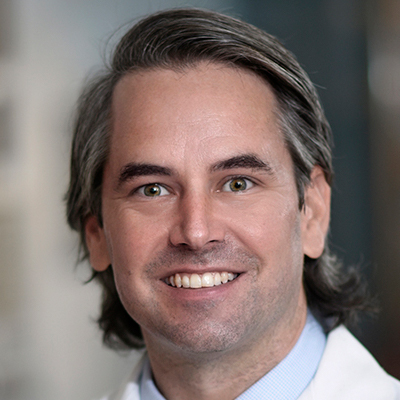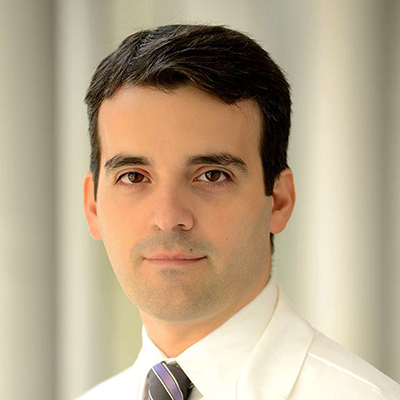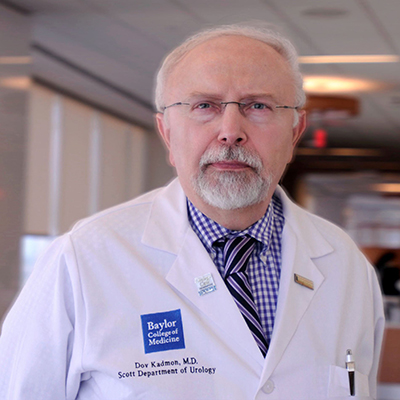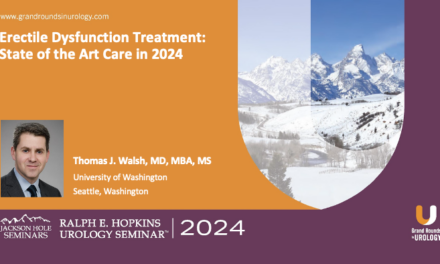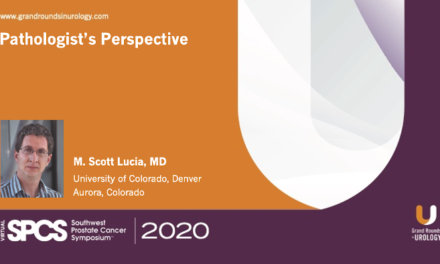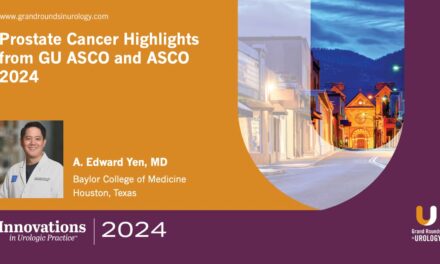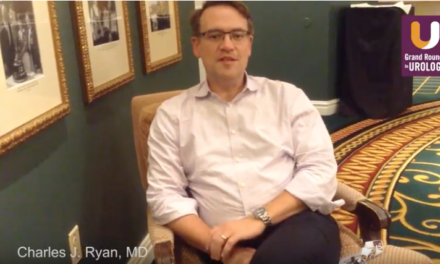Michael A. Brooks, MD, Guilherme Godoy, MD, MPH, and Dov Kadmon, MD, presented “Active Surveillance – When Can You Continue Watching and When Do You Intervene?” during the 25th Innovations in Urologic Practice conference on September 25, 2021, in Santa Fe, New Mexico.
How to cite: Brooks, Michael A, Godoy, Guilherme, and Kadmon, Dov. “Active Surveillance – When Can You Continue Watching and When Do You Intervene?” September 25, 2021. Accessed Jan 2026. https://grandroundsinurology.com/active-surveillance-when-can-you-continue-watching-and-when-do-you-intervene/
Active Surveillance – When Can You Continue Watching and When Do You Intervene?#
Guilherme Godoy, MD, MPH, Assistant Professor of Urology and Urology Oncology, Dov Kadmon, MD, Professor of Urology, and Michael A. Brooks, MD, Assistant Professor of Urology and Oncology, all at Baylor College of Medicine in Houston, Texas, discuss active surveillance (AS) for prostate cancer by using numerous case studies outlining patient characteristics, evaluation methods and diagnosis, the discussion and decision-making process, treatment, and outcome data to illustrate best practices. Their panel discussion covers magnetic resonance imaging (MRI)-fusion biopsy and systematic biopsy and highlights the need to use both as they are complementary. The doctors also discuss risk-benefit analysis; the role of urine, blood, and genomic testing; treatment algorithms, and important considerations such as those surrounding the patient’s overall health and life expectancy. Dr. Kadmon highlights the importance of integrating experience, common sense, and research. He emphasizes that integrating prostate MRI in AS protocol is imperative and MRI is important both when starting AS and in follow up. The doctors caution that MRI is not infallible; if the follow-up MRI is negative but there is strong suspicion for progression, a regular follow-up biopsy is justified. They advise that these follow-up biopsies be done for a reason and not just not based on an arbitrary time interval. Dr. Kadmon reiterates the point that a fusion biopsy and a systematic biopsy are complementary and should be carried out simultaneously and concludes by reviewing success elements involved in prostate MRI, including the equipment and protocols used, the experience of the radiologist, and whether the radiology program includes a quality improvement feedback loop, emphasizing that all these factors are important.
About The 25th Annual Innovations in Urologic Practice:#
Presented by co-chairs Mohit Khera, MD, MBA, MPH, and Michael Coburn, MD, FACS, the Innovations in Urologic Practice conference provides a detailed review and commentary on multiple genitourinary and urologic diseases. Among the featured oncological topics are bladder cancer and immunotherapies, as well as upper tract cancer management, prostate cancer, including state-of-the-art imaging, focal therapy, and MRI. Experts also discuss new tools and techniques for nephrectomy and treating advanced renal cell carcinoma. In terms of general urological approaches, the conference also includes pelvic reconstruction and trauma, men’s health topics like male infertility and sexual dysfunction, and ways to diagnose and treat infections in the urology patient. Drs. Brooks, Godoy, and Kadmon presented this talk at the 2021 conference.
For further educational activities from this conference, visit our collection page.
About the Authors#
Michael A. Brooks, MD#
Michael A. Brooks, MD, is an Assistant Professor of Urology and Oncology at Baylor College of Medicine in Houston, Texas. Dr. Brooks graduated from Baylor College Of Medicine with his medical degree in 2011. He is also affiliated with the Cleveland Clinic in Cleveland, Ohio. In his practice, he specializes in treating prostate cancer, erectile dysfunction, prostatitis, bladder issues, and other urologic disorders.
Guilherme Godoy, MD#
Dr. Godoy is an Assistant Professor of Urology and Urology Oncology at Baylor College of Medicine, Houston, Texas. He received his MD from Fundacao Universitaria do ABC in Sao Paulo, Brazil, and has received numerous fellowships at several institutions, including Memorial Sloan Kettering Cancer Center in New York City, Irmandade da Santa Casa de Misericordia de Sao Paulo Medical School in Sao Paulo, Brazil, Vancouver General Hospital in Vancouver, British Columbia, New York University School of Medicine in New York City, and Baylor College of Medicine. Dr. Godoy is skilled at managing patients with bladder cancer, kidney cancer, prostate cancer, and testis cancer. He also specializes in bladder issues, erectile dysfunction, kidney stones, and prostatitis. Dr. Godoy is a respected writer, researcher, and presenter as well, and has published numerous articles and papers. He has won a Best Published Clinical Research Paper Award from European Urology and has been recognized on several occasions as a Best Poster of the Section at American Urological Association Annual Meetings and European Association of Urology Annual Congresses. Dr. Godoy is also heavily involved in the medical community, both nationally and internationally. He is a member or candidate member of nine medical societies, including the Pan American Society of Anatomy, the Brazilian Society of Anatomy, the American Association of Cancer Research, and the Southwest Oncology Group.
Dov Kadmon, MD#
Dr. Kadmon is a Professor of Urology at Baylor College of Medicine in Houston, Texas. He received his MD from Hadassah Medical School in Jerusalem, Israel; completed residencies at Rokah Municipal Governmental Medical Center in Jerusalem and Washington University School of Medicine in St. Louis, Missouri; and received a Fellowship in Urologic Oncology at Washington University Affiliate Hospitals in St. Louis, Missouri. Dr. Kadmon is a devoted clinician. In his practice, he focuses on diagnosing and treating prostate cancer. He is particularly interested in using surgical techniques to treat prostate cancer. To that end, he has performed over 1,000 open radical prostatectomies, as well as over 1,000 robotic-assisted laparoscopic radical prostatectomies. Dr. Kadmon is also an internationally respected writer and researcher. He has published over 150 papers in the field of urology, and has received grant money for his research from the National Cancer Institute on multiple occasions. He has also served as a consultant on prostate cancer for the National Cancer Institute. Dr. Kadmon’s research interests include gene therapy and immunotherapy for prostate cancer, biological therapy for prostate cancer, and methods for preventing prostate cancer.
ABOUT THE AUTHOR
Guilherme Godoy, MD, MS, serves as assistant professor of urology at the Baylor College of Medicine (BCM) in Houston, Texas. He joined the faculty of the Scott Department of Urology at BCM in 2012 and has been the chief of the urology service at Ben Taub General Hospital (Harris Health System), since 2017.
Dr. Godoy earned his medical degree from Fundacao Universitaria do ABC in Sao Paulo, Brazil. His training includes an internship and residency in urology at Santa Casa De Sao Paulo in Vila Buarque, Brazil, and a fellowship in urologic oncology at BCM. Dr. Godoy has also completed urologic oncology fellowship training at Vancouver General Hospital, New York University, and Memorial Sloan-Kettering Cancer Center. He earned his MS in clinical investigations at BCM and has remained active in clinical research, translational studies, and clinical trials, mostly focused on prostate, urothelial (upper and lower urinary tract), and testicular cancers.
Dr. Godoy’s expertise includes early diagnosis, minimally invasive approaches (endoscopic and robotic), utilization of molecular and genetic tools for personalized decision-making, management of hereditary cancers, and surgical management of complex/large genitourinary (GU) tumors. His clinical areas of interest include adrenal and kidney tumors, urothelial cancers (upper and lower urinary tract including ureter, renal pelvis, bladder, and urethra), prostate cancer, penile cancer, and testicular and paratesticular cancers. Dr. Godoy also specializes in the utilization of intestinal segments for urinary tract reconstructions, and coordination of multidisciplinary approaches to manage complex intra-abdominal, retroperitoneal, and pelvic tumors. Dr. Godoy is responsible for and moderates the GU Tumor Board Meetings at Baylor St. Luke’s Medical Center as well as the St. Luke’s International GU Tumor Board Meetings.

